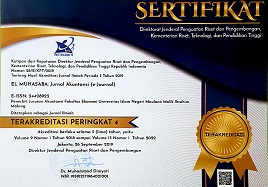Pola Hedonic Treadmill dalam Perilaku Akuntansi
Abstract
Purpose: This study aims to analyze the hedonic treadmill pattern in behavioral accounting in the millennial generation of shopee users. This study emphasizes the concept of behavioral accounting that is implemented in social phenomena in economic decision making based on the hedonic treadmill pattern.
Method: This study uses a qualitative descriptive method with a case study approach. The data were obtained by conducting interviews with key informants. Data analysis techniques in this study were data reduction, data presentation, and conclusion/verification.
Results: The results of the study show that there are four styles in making buying decisions in the millennial generation, namely the director's style, analytic style, conceptual style, and attitude style. In addition, the millennial generation is also driven by hedonic shopping motivation. From the empirical results, it was found that decision making is not only based on economic decisions alone. The non-economic impulses that form the hedonic treadmill pattern contribute to the behavioral accounting concept which is driven by psychological considerations in decision making.
Implications: The implication of this research is a new paradigm in the wider context of accounting theory, especially behavioral accounting where rational and irrational thinking can influence a person's decision making.
Novelty: Research tries to see accounting from another perspective to answer social phenomena. By integrating accounting theory and psychology as analytical tool, this research can explain this social phenomenon.
Keywords
Full Text:
PDFReferences
Abdolvand, Mohamad Ali., Kambiz Heidarzadeh Hanzaee., Afshin Rahnama., & Khospanjeh. (2011). The Effect of Situational and Individual Factors on Impulse Buying. World Applied Sciences Journal., 13(9), 2108-2117.
Buchari, A. (2011). Manajemen Pemasaran Dan Pemasaran Jasa. Bandung: Alfabeta.
Danuri, Muhamad. (2019). Perkembangan Dan Transformasi Teknologi Digital. Jurnal INFOKAM, 15(2).
Darma, L. A., & Japarianto, E. (2014). Analisa Pengaruh Hedonic Shopping Value Terhadap Impulse Buying Dengan Shopping Lifestyle Dan Positive Emotion Sebagai Variabel Intervening Pada Mall Ciputra World Surabaya. Jurnal Manajemen Pemasaran. 8(2}, 80-89.
Darwin, Muhammad. (2020). Pengaruh Strategi Communication Dalam Marketing 4.0 Terhadapa Purchase Decision Melalui Brand Advocacy Pada E-Commerce Shopee. Jurnal Ilmiah MEA (Manajemen, Ekonomi, & Akuntansi), 4(2), 375-396.
Devita, Fenalosa, Hilao. (2019). Pengguna Aktif Bulanan E-commerce di Indonesia dan Asia Tenggara. https://iprice.co.id/trend/insights/pengguna-aktif-bulanan-aplikasi-e-commerce-di-indonesia-dan-asia-tenggara/ , diakses tanggal 14 Oktober 2020.
Gillison, Stephanie, and Kristy Reynolds. (2016). Shopping for Yourself Versus Shopping For Someone Else. Journal of Consumer Marketing.
Handayani, Sutri. (2018). Perancangan Sistem Informasi Penjualan Berbasis E-Commerce Studi Kasus Toko Kun Jakarta. ILKOM Jurnal Ilmiah, 10(2), 182-189.
Haryono, T., & Panuntun, D. F. (2019). Model Gaya Hidup Nazir Sebagai Refleksi Gaya Hidup Hedon Pengkotbah Pada Zaman Milenial.”. Evangelikal: Jurnal Teologi Injili dan Pembinaan Warga Jemaat, 3(2).
Harahap, Machyudin Agung, and Susri Adeni. (2020). Tren Penggunaan Media Sosial Selama Pandemi di Indonesia. Professional: Jurnal Komunikasi Dan Administrasi Publik, 7(2), 13-23.
Hermawan, Herry. (2017). Sikap Konsumen Terhadap Belanja Online. WACANA: Jurnal Ilmiah Ilmu Komunikasi, 16(1), 136-147.
Kominfo. (2020). Dirjen PPI: Survei Penetrasi Pengguna Internet di Indonesia Bagian Penting dari Transformasi Digital. https://www.kominfo.go.id/content/detail/30653/dirjen-ppi-survei-penetrasi-pengguna-internet-di-indonesia-bagian-penting-dari-transformasi-digital/0/berita_satker , diakses tanggal 14 Oktober 2020.
Lestari, Niken Ayu. (2018). Pengaruh Kepercayaan Dan Kemudahan Transaksi Terhadap Keputusan Pembelian Secara Online Pada Situs Mataharimall.com. Jurnal Ilmu Manajemen (JIM), 6(1).
Lubis, Arfan Ikhsan. (2010). Akuntansi Keperilakuan. Jakarta: Salemba Empat.
Mambu, Trifena R., Johny RE Tampi, and Danny DS Mukuan. (2021). Kepercayaan Konsumen, Kualitas Layanan Terhadap Keputusan Pembelian pada Aplikasi E-Commerce Shopee di Kota Tondano. Jurnal Productivity, 2(1), 79-84.
Mamuaya, N. C. I. (2018). The Effect of Sales Promotion and Store Atmosphere on Hedonic Shopping Motivation and Impulsive Buying Behavior in Hypermart Manado City. DeReMa (Development Research of Management) Jurnal Manajemen, 13(1).
Obert. (2021). Pengaruh Reputasi Perusahaan dan Dukungan Selebriti Terhadap Ketertarikan Pada Iklan dan Produk. YUME: Journal of Management, 3(3), 95-105.
Samuri, Valentin IF, Agus S. Soegoto, and Djemly Woran. (2018). Studi Deskriptif Motivasi Belanja Hedonis Pada Konsumen Toko Online Shopee. Jurnal EMBA: Jurnal Riset Ekonomi, Manajemen, Bisnis dan Akuntansi, 6(4).
Sarmina, I., & Zuhra, S. E. (2016). Pengaruh Nilai Belanja Hedonis dan Utilitarian terhadap Loyalitas Destinasi Wisata dengan Kepuasan Belanja secara Keseluruhan sebagai Variabel Mediasi pada Destinasi Wisata Kota Sabang. Jurnal Ilmiah Mahasiswa Ekonomi Manajemen, 1(1), 110-125.
Sazali, Hasan, and Fakhrur Rozi. (2020). Belanja Online dan Jebakan Budaya Hidup Digital pada Masyarakat Milenial. Jurnal Simbolika: Research and Learning in Communication Study, 6(2), 85-95.
Sunerdi, Samardi. (2018). Psikologi Positif. Yogyakarta: Penerbit Titah Surga.
Zayusman, F., & Septrizola, W. (2019). Pengaruh Hedonic Shopping Value dan Shopping Lifestyle Terhadap Impulse Buying pada Pelaggan Tokopedia di Kota Padang, 1, 360–368.
DOI: https://doi.org/10.18860/em.v14i1.15266
Refbacks
- There are currently no refbacks.
Editorial Office:
Megawati Soekarnoputri Building
Accounting Department, Faculty of Economics
Jln. Gajayana 50 Telp (0341) 558881
E-mail: elmuhasaba@uin-malang.ac.id
Universitas Islam Negeri Maulana Malik Ibrahim Malang
E-ISSN 2442-8922
P-ISSN 2086-1249

This work is licensed under a CC BY SA 4.0 International License


















